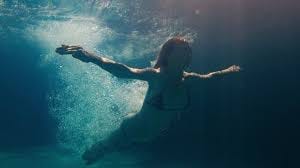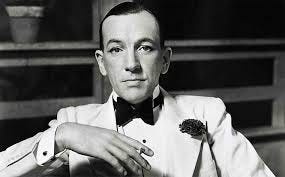The other day, Richard and I walked on Warren Street in the vortex of heat. We were the only ones visible, and I was reminded of Noel Coward singing “Mad Dogs and Englishmen go out in the Midday Sun.” We were one mad dog and one Englishman.
In the heat, I suddenly remembered a beautiful woman I met in the sauna at the Paris Health Club. Her name was Barbara, and she would swish sweat from her long, toned limbs. She developed a form of blood cancer and eventually died. When she was diagnosed, she wondered if sweating for long periods had produced the cancer. We all thought whatever gave us pleasure would kill us.
When I was eight years old, I performed “Mad Dogs and Englishmen go out in the Midday Sun” before an audience of adoring campers. It was for a talent contest, and I won. How did I come to learn this piece, with its merrily oblivious colonial hauteur? I took elocution classes with a neighbor woman in Long Beach. I can see her in her plump enthusiasm and lostness. I loved these classes.
The woman, I’ll called her Mrs. Warren, gathered us on the floor of her living room, where there was an upright piano against a lime green wall. She would hand out little slips of onionskin paper, cut unevenly, on which were typed short monologues and piano-logues, as she called them. We’d have to memorize the words. She’d come around with a feather, and we’d have to make it flutter with our breath when we said words that began with a wh—whisper, what, where, whisker. I don’t remember the other pronunciations she taught us.
What was she trying to install in our little-girl, Long Island diction. I never had that diction. Maybe because of Mrs. Warren. There was a madness to these afternoons that, even in our young minds, we understood as a form of time travel. Mrs. Warren wasn’t trying to prepare us for a future anyone imagined. She was preparing us for the past. The concept of “elocution lessons” must have been a dead thing thirty years before we were born. When it was my turn to say my assigned piece, I’d stand by the piano, and Mrs. Warren would play in accompaniment. I was a ham. Where did she get the pieces? The times we live in capture other times on the fade or on the rise again—a flicker, a taste, a wave of recognition or farewell.
I thought of Barbara as the queen of the sauna. She was so beautiful and alive, I don’t remember anything else about her. In the sauna, all of us naked, women talked about their lives and brushed off their sadness along with the sweat. It was a grown-woman version of afternoons at Mrs. Warren’s. In the sauna, mainly I listened to the women’s stories, and on the day Barbara told me—or it could have been a group of us—about the cancer, it didn’t seem possible. I didn't believe it until she died. I still don’t believe it. Afterward, someone carved "Barbara forever" on one of the teak platforms. When she feared she had caused it, I told her it couldn’t be true.
The other night, Richard and I watched a documentary about Noel Coward. He was born poor and turned himself into the gold standard of suave and wit by going on the stage as a boy and never leaving it. His plays were hugely successful. He wrote the screenplay for the brilliant film Brief Encounter, directed by David Lean—every time you hear Rachmaninoff’s Piano Concerto No. 2, which is the score of the film, you find yourself telling Trevor Howard your love is wrong and also so right, oh dear. Coward was in giant favor throughout the 1930s and 1940s. After the war, he came off passé for his class affectations. In the 1960s, he tripped into fame again with a Vegas act that was a smash hit. That’s where, in the documentary, we see him singing “Mad Dogs and Englishmen,” a song he’d written in 1931.
He sings it fast and with continually surprising phrasing.
Here are some of the lyrics:
In tropical climes, there are certain times of day
When all the citizens retire to tear their clothes off and perspire
It's one of those rules that the greatest fools obey
Because the sun is much too sultry and one must avoid its ultry-violet ray
But mad dogs and Englishmen go out in the midday sun.
The Japanese don't care to
The Chinese wouldn't dare to
Hindoos and Argentines sleep firmly from 12 to one
But Englishmen detest a siesta
. . . In the Philippines, there are lovely screens to protect you from the glare
In the Malay States, there are hats like plates which the Britishers won't wear
At 12 noon, the natives swoon and no further work is done
But mad dogs and Englishmen go out in the midday sun
. . . The toughest Burmese bandit can never understand it
In Rangoon, the heat of noon is just what the natives shun
They put their Scotch or Rye down, lie down
. . . In the mangrove swamps where the python romps
There is peace from 12 'til two
Even caribous lie around and snooze
For there's nothing else to do.
I recited these words. Not as well as Noel, I can see from the footage.
The faces in the Vegas audience looked surprised by the pleasure Coward was producing in them. It was another convergence of time travelers showing up at the same cantina. They were used to seeing Frank Sinatra and the other rats in the pack with their shiny sharkskin suits and slurred drunken foolery. Noel, with perhaps a little more meat on him, was still the sleek gentleman with smoothed hair in a white dinner jacket. He looked as startled as the audience by the way, together, they were producing joy.
Why did Richard and I walk in the vortex of heat? Because mad dogs and Englishmen go out in the midday sun. On the way back up the hill, I felt a little nauseous. Richard quoted the epidemiologist he reads on Substack, who said it takes a harder toll on the body to move in 90-degree humid heat than in the 120-degree dry heat of Arizona. I said I didn’t believe that. He said it was true. I had experienced 120 degrees in Arizona. You walk in a microwave oven. Planes can’t leave the tarmack because it’s melting.
Outside our house, on the patio, are pots of herbs that need planting. I watered them. All the umbrellas are up. I cut basil, Thai basil, thyme, and parsley and made Richard a tortilla roulade with salad, chicken, and peanut butter. The next day we went to Albany to buy me a new computer. My old computer, where all the pieces of my past are stored, has been telling me it’s dying and needs a new body to continue. I am holding its hand. Right now, my favorite characters on TV are Murderbot and Harry, the alien from Resident Alien. I feel the same confusion they feel in understanding humans. I feel, still, the things that give you pleasure can kill you. Nabokov said time was a curtain, where events unrelated in reality touch each other in the folds of memory.
_____________________________________________________
Biz
There is no paywall. There will never be a paywall. There is “churn.”
People move on. I write them notes of thanks for their support. I am sincere.
"The churn" kills publications that don't attract new subscribers. I'm not saying my stack is a dog that will be shuffled off to the pound if you don't take a turn at support, but if that image is difficult to dislodge, I would be the last person to come along with a tweezer.
Fantastic new benefits include guest writers and artists at monthly Zoom conversations at no extra charge, the first one, with
, is tomorrow Saturday June 28 from 3 to 4 EST.Upcoming guests include:
, , , and , founder of the media “empire” Dirt.Please take a turn at a paid subscription, for a month or a year.
_____________________________________________________
Streaming Now
We watched Jaws again. It had been 50 years. It was great. Robert Shaw received an Oscar for over acting! A very competitive category. Richard Dreyfuss has this insouciant, just-on-the-verge-of-annoying Jew energy in Wasp town thing going. The shark, who was named Bruce, is excellent. Great casting. Spielberg has this wife-mothers reflex in his films. The women exist entirely in the wife-mother box and in this movie, played by Lorraine Gary, she is flagged with several do-rag schmattas she has to wear for no reason. As if the movie is set in Anatevka instead of pretend Martha's Vineyard. Many thumbs up!
_________________________________________________________
Happenings for paid subscribers.
The next Zoom Conversation
features guest writer Steven Dunn and is on SATURDAY June 28 from 3 to 4 EST. To RSVP, please email me at: lauriestone@substack.com
Steven Dunn (a.k.a Pothole, cuz he’s deep in these streets) is a Whiting Award winner who was shortlisted for Granta Magazine’s Best of Young American Novelists. He’s the author of three novels: Potted Meat, Water & Power, and Tannery Bay, which is co-authored with his homie Katie Jean Shinkle.
Potted Meat is a 2017 Colorado Book Award Finalist, VICE Magazine’s Best Books of 2016, and adapted into a short film by Foothills Productions called "The Usual Route." "The Usual Route" has played at the LA International Film Festival, Houston International Film Festival, and others.
A quick way to lend one-time support and attend the next Zoom is to tip your server with a $4 coffee: ko-fi.com/lauriestone
The Next Breakout Conversation
Is Sunday June 29 from 3 to 4 EST, where you can speak about a project you are working on and receive feedback, please email me at: lauriestone@substack.com. There is a cap of 10 participants and an additional cost of $30.
To request a recording of the last Zoom Conversation on May 31
Please email me at: lauriestone@substack.com
Working together one to one
If you would like to book time to talk one-on-one about a project you are working on or for guidance in gaining confidence and freedom in your writing, please email me at: lauriestone@substack.com.
If you would like to book time to talk one-on-one about STARTING AND GROWING a Substack publication please email me at: lauriestone@substack.com. I can help you through the software and approaches to gaining readers.











Mrs. Warren's feather reminded me of Shaw's Pygmalion: “In Hampshire, Hereford and Hertford, hurricanes hardly happen.”
In the folds of memory I am painting in an Oklahoma City shack while listening to Ella Fitzgerald sing Cole Porter. Thank you for that spark.